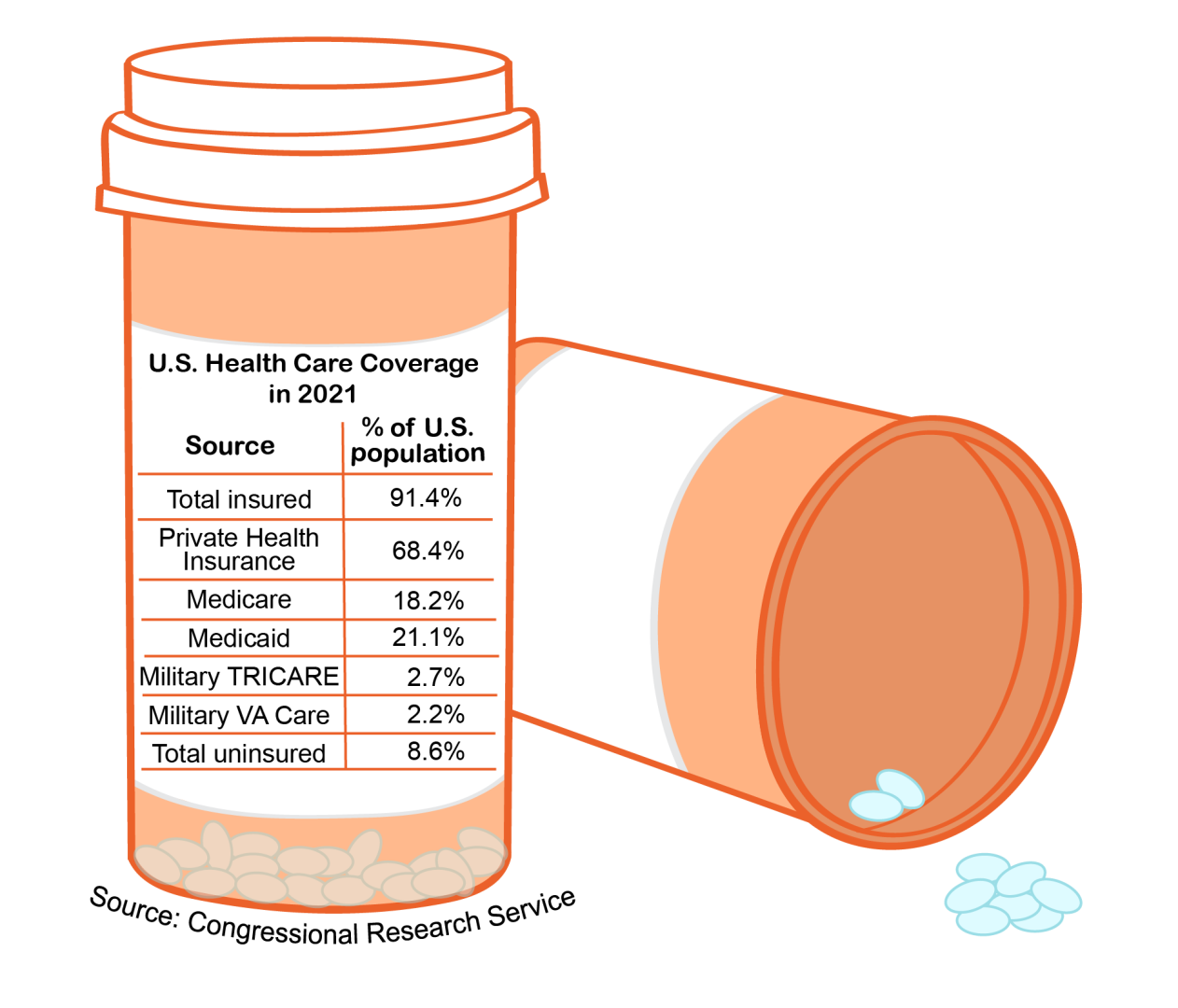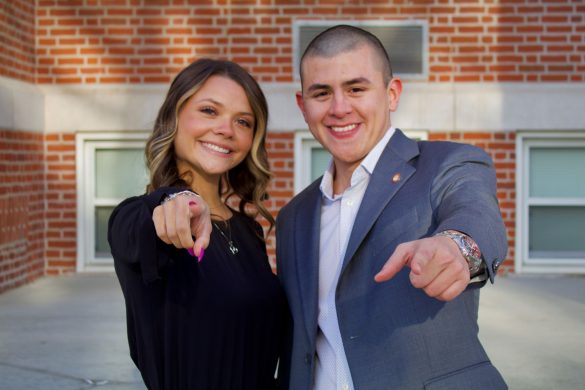For a country that associates itself with liberty and freedom, it is extremely hard to access necessary healthcare. The United States healthcare system is plagued by a plethora of issues that make it difficult for almost anyone to afford, or sometimes even receive, medical care. These issues have affected me personally in a number of ways over the past year.
First, it is important to identify how the healthcare system works in the U.S. According to the National Library of Medicine, “The United States primarily relies on employers to voluntarily provide health insurance coverage to their employees and dependents; government programs are confined to the elderly, the disabled, and some of the poor. These private and public health insurance programs all differ with respect to benefits covered, sources of financing, and payments to medical care providers.” To state it simply, the government does not ensure access to health insurance for everyone. The programs that the government does provide, such as Medicare and Medicaid, are based on eligibility requirements such as age, having certain disabilities or conditions and having a low enough income, according to the U.S. Department of Health & Human Services. Basically, there are limitations and barriers to being eligible for federal and state programs.
Most health insurance is provided by for-profit insurance companies, according to Today. Individuals pay the company for insurance by having a portion of the cost taken from their paycheck by their employer. These for-profit companies are mainly interested in making money and therefore look for ways to avoid covering the cost of medical care. Additionally, the U.S. pays doctors and specialists more than other countries do and healthcare administrative costs are higher. It has been reported that a significant percentage of doctors called “the time they lose to issues surrounding insurance claims and reporting clinical data a major problem,” according to CNBC. The U.S. also charges more for pharmaceuticals and medical procedures than other countries. These are all reasons why even insured people struggle to afford medical care.
I am on my mother’s insurance plan, which she receives through her employer. Because she works at a hospital, one might expect her plan to be pretty good. Well, maybe it is when compared to other insurance plans. All I know is that I do not feel covered when I receive the bills, which have seemed endless since I went to the emergency room in September of 2021.
I was sitting on the couch watching television with my husband. My abdomen started to hurt, which was not new to me. I have always had a somewhat sensitive stomach, so I did not think much of it. In a short amount of time, though, I found myself in tears from the agony. We quickly got into the car and went to urgent care. On the way there, the pain was so bad that I was going in and out of consciousness in the passenger seat. As soon as we walked into the waiting room, I fell on the floor and began to vomit. A few nurses helped me to sit up and took my vitals. They called an ambulance to take me to the hospital. I had no idea what was happening, and I was very frightened. In the ambulance, the Emergency Medical Technician did some quick tests that I can not really remember. He said it could be a number of things, including an ectopic pregnancy, but that I would be okay.
Luckily, they were able to put me in a bed almost as soon as I arrived at the hospital, but I was in unbearable pain for hours as I waited for help. Nurses came in and out to ask me questions, type things on a computer, ignore me as I begged them for medication to ease the pain and then swiftly exit to not be seen again for long intervals of time. They could not even be bothered to look at me. (According to Duke Health, “One in five women say they have felt that a health care provider has ignored or dismissed their symptoms.” Just another issue with U.S. healthcare to add to the list.) I am not exaggerating when I say that I was scared the pain would kill me. Eventually, they gave me a shot of something that made the pain go away.
My husband and I did not leave the hospital until almost three in the morning. After hours of waiting and one ultrasound, I was told I have an ovarian cyst and a urinary tract infection and sent home with a prescription for antibiotics and pain medication.
My insurance did not cover the ambulance bill and only covered a portion of the ER bill. All in all, I owed around $5,000. And then it all happened again not even a month later. Urgent care, ambulance, hours in the hospital and $5,000 more. The antibiotics they had given me were not strong enough—which they would have known if they had tested my urine the first time I was at the ER—so the infection never went away. I left with another prescription for antibiotics and pain medication.
After all of this,I was still getting UTIs consistently. They were not bad enough to send me to the hospital again, but it was unpleasant nonetheless. I kept having to get antibiotic prescriptions from the UIndy Health and Wellness Center because they did not charge me to be tested. I began seeing a urologist after a few months of struggling. She told me that because doctors kept giving me antibiotics without looking into the problem, so much bacteria had grown in my bladder that it will likely never go away. And because taking antibiotics constantly makes your body get used to them, I should only take them from now on when I am experiencing pain. I also take supplements now for bladder health and have to do my best to stay hydrated.
Each urologist visit is about $200, with an additional $100 or more if I receive a test. The cost does not help encourage me to keep making appointments–it makes me feel guilty for seeking care. I know I should not feel that way, but it is hard not to. I feel bad for being the reason that my husband’s and my savings are being spent in large amounts.

Thankfully, I have not been having many problems as of late when it comes to my bladder health. Although, I have been dealing with a new issue concerning healthcare: access to my medication. I take Adderall Extended Release capsules to help manage my Attention Deficit Disorder. Due to an ongoing shortage of Adderall that began in October of 2022, according to the FDA, I have been having a hard time getting my prescription.
Now, I understand why the shortage is happening and that it was not intended by the manufacturers. My problem, once again, is with insurance. Because private insurance companies make partnerships and have “preferred” healthcare providers and pharmacies, I was unable to pick up my prescription from a pharmacy that I had been able to get it at before. I was told that insurance companies will allow you to pick up the prescription one time at a non-preferred pharmacy, but they will not cover it after that one time. Adderall is a controlled substance, which means that every time I want my prescription sent to another pharmacy I have to contact my doctor. So, I had to not only find out through trial and error which pharmacies even had my pills in stock, but I also had to call my doctor and wait for the prescription to be received by the pharmacist every time I needed it sent somewhere. I ended up going several days without my medication, which caused me to struggle with schoolwork and social interactions.
It should not be this hard to receive healthcare for anyone. If I am insured and struggle this much, I cannot imagine how difficult it must be for those who are uninsured and not eligible for government assistance. According to a study from The Commonwealth Fund, the U.S. healthcare system ranks last among 11 high-income countries. The report said: “A high-income person in the U.S. was more likely to report financial barriers than a low-income person in nearly all the other countries surveyed.” It is time for the U.S. to adopt universal health care, as almost all other industrialized countries have. Healthcare is a human right, and I, for one, am tired of having that right violated by greed.








